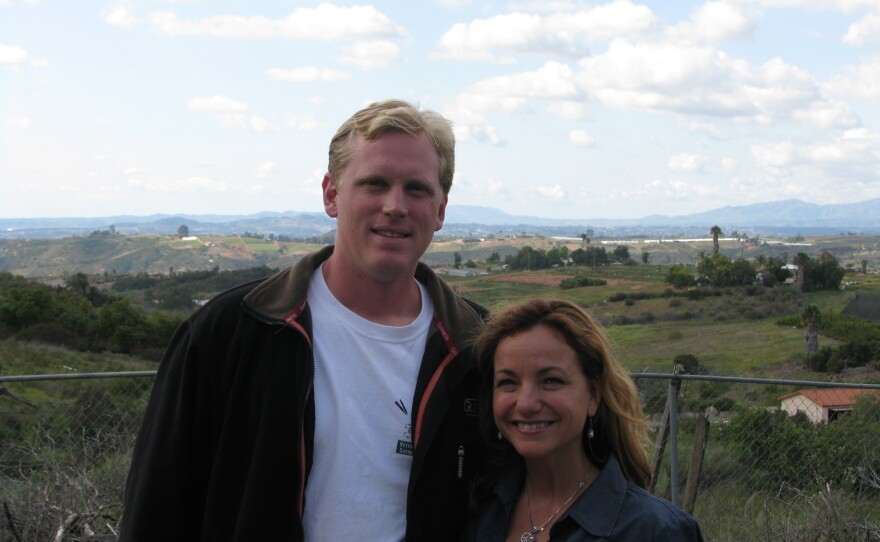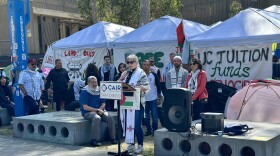Colin and Karen Archipley walked up the driveway of their small avocado farm in Valley Center. They moved here when Colin left the Marine Corps after three deployments to Iraq in four years.
It’s an idyllic location, but the Archipleys soon realized they couldn’t make a go of it with water bills of more than $1,000 a month. They cut down some of their avocado trees, built greenhouses, and started an organic hydroponic herb-growing operation.
Now they can’t grow enough basil to meet the demand from places like Whole Foods and Jimbo’s.
Colin Archipley walked into the greenhouse where rows and rows of basil are growing in long white plastic pipes. He said he has managed to cut his water use down by 90 percent by using hydroponic technology.
He’s convinced he and his wife have found a niche that fulfills a national need. He said two-thirds of family farmers are retiring, and the USDA has a push to create 100,000 new farmers per year over the next five years.
“They are not going to meet those goals,” Archipley said, “but we think we have a population who can certainly help, who have the motivation and the willingness to do this, as well as the leadership and management skills to operate a business.”
The Archipleys believe qualities learned in the military translate well into entrepreneurship. And, as Karen points out, farming already runs in the blood for many of those who enlisted.
Karen added it’s the kind of business where a husband and wife team has an advantage.
The couple started to offer classes though MiraCosta College to help other Marines make the leap from active duty to self-supporting civilian. They teach the latest water saving irrigation techniques, and how to market crops to build a successful business.
In a big barn, a handful of students gathered around a makeshift table to watch the power point presentations each created to illustrate their business plans for the future.
Mike De Alba, 26, heard about this class during a “transition assistance program” at Camp Pendleton. He’ll be out of the Marine Corps next month. He and his wife Stephanie plan to go back to his family’s farm in Northern California.
“Growing up,” De Alba said, “I always had a big interest in gardening and growing and plants in general. To be able to put something in the ground and watch it evolve in front of you and know you were the one that created that - I developed a passion for it.”
De Alba served four years in the Marine Corps as a water support technician, dealing with things like with water purification, filtration and distribution. Now he’s learning how to conserve water in another context -- agriculture. His father wants him to try a similar operation when he comes home.
Not all the Marines who’ve come for this training grew up around agriculture.
Matt Hotzmann was a big city boy. He served as a systems engineer for five years in the Marine Corps and is already being wooed by companies like IBM. However, he has other plans. He wants to be an aquaponics farmer.
“Aquaponics is the marriage of aquaculture and hydroponics,” he explained. “So we raise fish that provide our nutrients for the water that then goes to the plants in the hydroponics system. Those plants filter out that water which returns to the fish. So, just like hydroponics, we use 90 percent less water, but we don’t have to add nutrients to that water like they do here.”
Holtzman pointed out a 300-gallon tank that re-circulates water filled with organic nutrients. It irrigates rows of lettuce and Swiss chard growing under a shade cloth. He said the hydroponics operation at Archi’s Acres is unusual in that it doesn’t use nitrogen-rich chemicals out of a bottle.
“Here we actually brew our own tea,” he explained. “It’s made out of worm castings, fish meal, and coco fiber.”
This is about more than growing greens for Holzmann. He believes food production, and energy conservation are matters of national security.
“I tied together managing our natural resources and national security, “he said, “and I’m a techno geek, so that’s where the aquaponics fits in for me.”
Holzmann knows he has a challenge ahead. He’s breaking into a new field and he’ll need financing and business smarts. He’s put together a business plan and he’s ready to take a risk -- like he did when he signed up to be a Marine.
Colin Archipley believes there’s a key to making a successful transition back to civilian life.
“I think for returning vets the most beneficial thing we can do for them is give them a meaningful job that has a continued mission.”
With water shortages threatening agriculture all over California, this mission is no easy assignment, but if anyone can succeed, it’s probably a former Marine.






